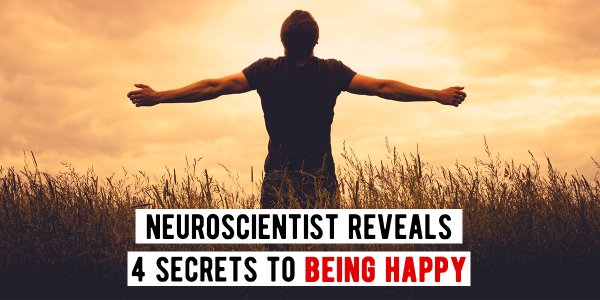UCLA Neuroscience Researcher Reveals 4 Rituals That Will Make You Happy

Alex Korb is a neuroscientist and author of The Upward Spiral. His book challenges readers to face depression head on and provides dozens of small, practical things that you can do to alleviate your symptoms. Here are four ways you can create an upward spiral of happiness in your life.
Label Negative Feelings
Are you sad? Angry, Nervous? If you are feeling down, Korb encourages you to name the emotion. According to an fMRI study, putting feelings into words is a way of consciously recognising emotions. Participants were shown pictures of people with emotional facial expressions. As expected, each participant’s amygdala reacted to the emotions in the picture. However, when participants were asked to name the emotion, another brain region – the prefrontal cortex was activated. This disrupted the amygdala activity and reduced the impact of the emotion. Based on these findings, Korb suggests that naming your emotions produces therapeutic effects in the brain.
Be Grateful
Gratitude affects your brain at the biological level. By simply finding reasons to be grateful (however small) your brain will be happy. It can also create a positive feedback loop in your relationships.
Via The Upward Spiral:
It’s not finding gratitude that matters most; it’s remembering to look in the first place. Remembering to be grateful is a form of emotional intelligence. One study found that it actually affected neuron density in both the ventromedial and lateral prefrontal cortex. These density changes suggest that as emotional intelligence increases, the neurons in these areas become more efficient. With higher emotional intelligence, it simply takes less effort to be grateful.
So what are you grateful for?
Touch People
Relationships play a very important role in how your brain feels happiness. Neuroscientists conducted a study where participants played a ball-tossing video game. The participants were told that the characters they were playing ball with were real people. However, this was not true. The characters were just a computer program. Results showed that the participants’ brains responded in the same way as if they had experienced physical pain. This suggests that feeling love and acceptance from others is good, if you face rejection, your brain feels the effects of this.
Make That Decision
Making decisions reduces worry and anxiety. Of course, deciding on how best to proceed is not always easy, but don’t worry, neuroscience has an answer. Korb says that you should make a “good enough” decision. If you try and make the ‘perfect’ decision, it will only overwhelm your brain with emotions and this will make you feel like you don’t have control.
Via The Upward Spiral:
Trying for the best, instead of good enough, brings too much emotional ventromedial prefrontal activity into the decision-making process. In contrast, recognizing that good enough is good enough activates more dorsolateral prefrontal areas, which helps you feel more in control…
IMAGE CREDIT: fotomaximum / 123RF Stock Photo
THIS ARTICLE IS OFFERED UNDER CREATIVE COMMONS LICENSE. IT’S OKAY TO REPUBLISH IT ANYWHERE AS LONG AS ATTRIBUTION BIO IS INCLUDED AND ALL LINKS REMAIN INTACT.
I am Luke Miller, content manager at Truth Theory and creator of Potential For Change. I like to blend psychology and spirituality to help you create more happiness in your life.Grab a copy of my free 33 Page Illustrated eBook- Psychology Meets Spirituality- Secrets To A Supercharged Life You Control Here
Leave Comment: